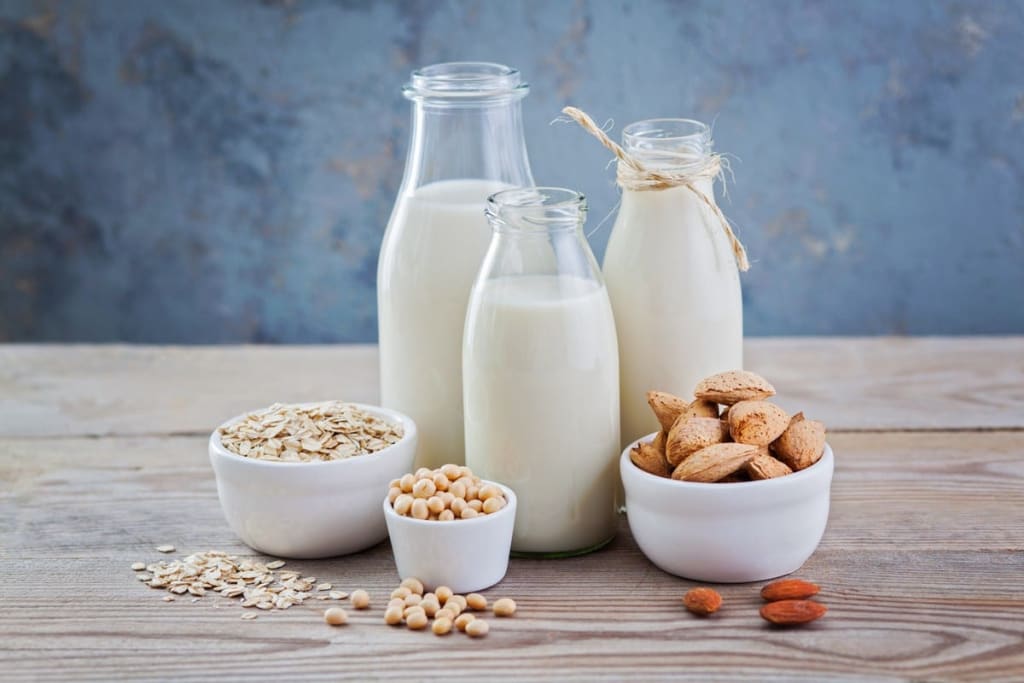
For those who choose a dairy-free diet or have allergies and intolerances, alternatives to dairy milk are becoming more and more common.
However, consumers might not always be aware of the variations in micronutrient content between dairy milk and plant-based milk substitutes.
As a result, when scientists examined different plant-based milks, they discovered that the mineral concentration varied not just by brand but also by type.
Milk substitutes made of plants are widely used for ethical, environmental, and health reasons. It's possible that many people prefer the flavor of plant-based milk substitutes to conventional cow's milk.
Soy, coconut, oat, hemp, rice, quinoa, pea, almond, and other types of nuts are among the alternatives for plant-based milks, although the nutritional profiles of different brands and varieties frequently differ.
Consumers should be aware of the variations in the nutritional value of any plant-based milk replacements they are ingesting since dairy milk is a significant source of micronutrients including phosphorus, selenium, and zinc.
Previous studies compared the nutritional benefits of plant-based milk substitutes to those of cow's milk. Additionally, the mineral content of various plant-based milk beverages has recently been examined by experts from the Institute of Food Safety and Health (IFSH), who discovered variances in mineral content between types and brands.
The findings revealed that soy milk had the highest level of magnesium overall, whereas pea-based beverages had the highest levels of phosphorus, selenium, and zinc.
The American Chemical Society (ACS) fall meeting was where the researchers presented their findings.
Why choose plant-based milk alternatives?
People may prefer plant-based milk substitutes for the following reasons, according to licensed dietitian and Association for Nutrition colleague Dr. Sue Reeves, who was not involved in the new study.
Allergies and intolerances: Some people cannot break down lactose because they can not generate the enzyme lactase.
Veganism: Out of concern for the welfare of animals, those who consume a vegan or plant-based diet refrain from using or consuming any animal products.
Sustainability: People may decide to give up dairy for environmental concerns because, among other ecological repercussions, cows emit greenhouse gases.
How plant-based milks were analyzed
Almond, cashew, coconut, hemp, oat, pea, rice, and soy are a few of the plant-based dairy substitutes that were examined by researchers from the IFSH, a collaboration between the Illinois Institute of Technology and the Food and Drug AdministrationTrusted Source (FDA). These products are all sold under different trade names.
They used a method known as inductively coupled plasma mass spectrometry (ICP-MS) to analyze the amounts of magnesium, phosphorus, zinc, and selenium in a total of 85 samples as part of their analysis. This technique is incredibly sensitive for figuring out the precise concentration of a certain element, like a metal, in a given sample.
They chose these particular micronutrients because, despite the fact that they are well-known to be present in dairy milk, they are not required to be listed on the Nutrition Facts labelTrusted Source of food products.
The researchers discovered that the mineral content varied greatly using statistical analysis. There were variations not only between brands of the same kind of product but also between other types of plant-based milk substitutes (such as soy-based versus almond).
Only drinks made from pea and soy exhibited higher levels of magnesium, phosphorus, zinc, and selenium when compared to cow's milk out of all the samples examined in the study. The highest was pea milk, with amounts of phosphorus, zinc, and selenium that were roughly 50% higher.
The FDA research scientist and study's primary investigator, Ben Redan, PhD, gave MNT an explanation of why it's crucial to take into account the variations among plant-based milk substitutes.
It's critical for consumers to comprehend how their usage of plant-based milk substitutes may affect their overall intake of vital mineral micronutrients, he said, as the products' popularity has grown.
Lily Chapman, BSc, MSc, a performance coach and sport and exercise nutritionist who was not involved in the study, concurred and pointed out to MNT how different plant-based milks typically have distinct nutritional profiles.
This is exacerbated further by the fact that there are now additional types of plant-based milk, fortifications, and brands available, which may alter the nutritional contents, according to Chapman.
Benefits of pea-based plant milk
According to Dr. Redan, "our comparisons of target mineral micronutrients are based on a market basket of two to three brands among eight types of plant-based milk replacement products" (beverages made from oat, pea, rice, hemp, cashew, and soy).
The researcher claimed that the findings of the study show that "certain plant-based milk substitutes can be a source of mineral micronutrients, although variances across product types should be taken into consideration when determining their nutritional value."
Dr. Redan stated that the goal of his research was to evaluate certain mineral micronutrients in plant-based milk alternatives.
One drawback is that, according to him, "we did not examine how specific components contained in some of these goods may diminish the ability of the body to absorb these nutrients" (i.e., how their bioavailability may be impacted). Another issue is that customers who are allergic to tree nuts or soybeans should stay away from items containing those ingredients.
Which plant-based milks should you choose?
Pea and soy milks have robust nutritional profiles, but not everyone will be a good fit for these options. For instance, soy milk may not be good for people with certain sensitivities, whereas milk made from peas may upset the stomach.
While the study's goal is to educate consumers rather than to recommend one brand of plant-based milk over another, the researchers do hope that the information regarding vital minerals may aid them in making decisions about plant-based milk substitutes.
“It is certainly worth checking the labels on plant-based milk alternatives since some are sweetened and contain added sugars, and many are low in protein,” Dr. Reeves said. “Furthermore, plant-based milks can be low in calcium, iodine, and vitamin B12, nutrients that are normally found in cow’s milk, so have a look at the label to see if they are fortified.”
In addition, some plant-based alternatives, such as almond milk, may have a negative impact on the environment. To that end, oat milk has been suggested as the most sustainable plant-based milk alternative.
“Overall, each milk has a variety of pros and cons when looking at their different nutritional properties,” Chapman said.
"In my opinion, I'd choose the milk that tastes the best to you and that works with your specific needs and circumstances. Dairy is not suitable for someone who is lactose intolerant, for instance. Nut allergies? Avoid drinking almond milk. With estimations that the global impact of animal agriculture accounts for 14.5% of emissions caused by humans, ethics is still another factor to be taken into account. With this, it has been discovered that animal welfare and sustainability are powerful advocacy objectives.
Maintaining a healthy, balanced diet is essential for general health and wellbeing, just like with any other dietary decision. Some people might decide to switch between several plant-based milk substitutes, which could enrich their diet with a range of micronutrients.





Comments
There are no comments for this story
Be the first to respond and start the conversation.